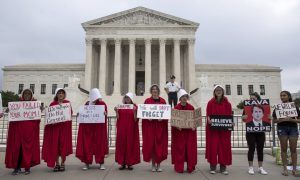Hannah Jameson in The Guardian:
 A couple of months ago, Twitter user @emrazz asked women what they would do in a hypothetical 24 hours if there were no men around. The responses were depressingly banal: sleeping with the windows open or finishing drinks in our own time, instead of feeling pressured to down them before heading to the bathroom, lest a man slip something in the glass. Going for walks at night was a common answer, bringing to mind Will Self’s piece ruminating on the joys of midnight walks, an “underrated pleasure” few women would seriously consider. These answers illustrate that, given a day without men, women would simply conduct themselves as full participants in the world, free from fear.
A couple of months ago, Twitter user @emrazz asked women what they would do in a hypothetical 24 hours if there were no men around. The responses were depressingly banal: sleeping with the windows open or finishing drinks in our own time, instead of feeling pressured to down them before heading to the bathroom, lest a man slip something in the glass. Going for walks at night was a common answer, bringing to mind Will Self’s piece ruminating on the joys of midnight walks, an “underrated pleasure” few women would seriously consider. These answers illustrate that, given a day without men, women would simply conduct themselves as full participants in the world, free from fear.
The Office for National Statistics said that one in five women in England and Wales will experience sexual assault in their lifetime; the UN’s worldwide estimates say it is more than one in four, with much higher figures for women of colour and refugees. Does this endemic violence – a glaring symptom of how a patriarchal society is both formally and informally enforced – not fulfil the most basic definitions of a dystopia? People of all marginalised groups are uniquely situated to imagine a dystopian society, because we already inhabit one: a brutal parallel universe, of which only the privileged can remain unaware. Just as male dystopian authors including JG Ballard, George Orwell and Philip K Dick once reflected societal horrors back to their readers, many women writers are exploring current oppressive realities. Vox by Christina Dalcher is set in an America where women are literally silenced, Before She Sleeps by Bina Shah sees women forced to take multiple husbands, while Red Clocks by Leni Zumas explores the consequences of abortion being outlawed completely.
More here.
